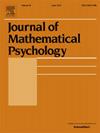Lexicographic Majority
IF 2.2
4区 心理学
Q2 MATHEMATICS, INTERDISCIPLINARY APPLICATIONS
引用次数: 0
Abstract
This paper explores a relationship between lexicographic and majority preferences as a novel explanation of preference cycles in choice. Already May (1954) notes that, among subjects in his experiment who did not display a (majority) preference cycle, a vast majority ordered alternatives according to an attribute that they found overridingly important, suggesting that a lexicographic heuristic was used. Our model, Lexicographic Majority, reconciles these findings by providing a unified framework for lexicographic and simple majority preferences. We justify lexicographic majority preferences by providing an axiomatization in terms of behavioral properties.
词汇多数
本文探讨了词法偏好和多数偏好之间的关系,以此作为对选择中偏好循环的一种新的解释。梅(May,1954 年)已经指出,在他的实验中,没有表现出(多数)偏好循环的被试中,绝大多数人是根据他们认为最重要的属性来排列备选方案的,这表明他们使用了词典启发式。我们的 "词法多数 "模型为词法和简单多数偏好提供了一个统一的框架,从而调和了这些发现。我们通过提供行为属性的公理化来证明词典多数偏好的合理性。
本文章由计算机程序翻译,如有差异,请以英文原文为准。
求助全文
约1分钟内获得全文
求助全文
来源期刊

Journal of Mathematical Psychology
医学-数学跨学科应用
CiteScore
3.70
自引率
11.10%
发文量
37
审稿时长
20.2 weeks
期刊介绍:
The Journal of Mathematical Psychology includes articles, monographs and reviews, notes and commentaries, and book reviews in all areas of mathematical psychology. Empirical and theoretical contributions are equally welcome.
Areas of special interest include, but are not limited to, fundamental measurement and psychological process models, such as those based upon neural network or information processing concepts. A partial listing of substantive areas covered include sensation and perception, psychophysics, learning and memory, problem solving, judgment and decision-making, and motivation.
The Journal of Mathematical Psychology is affiliated with the Society for Mathematical Psychology.
Research Areas include:
• Models for sensation and perception, learning, memory and thinking
• Fundamental measurement and scaling
• Decision making
• Neural modeling and networks
• Psychophysics and signal detection
• Neuropsychological theories
• Psycholinguistics
• Motivational dynamics
• Animal behavior
• Psychometric theory
 求助内容:
求助内容: 应助结果提醒方式:
应助结果提醒方式:


